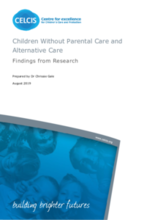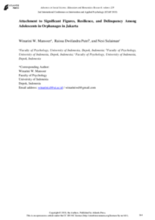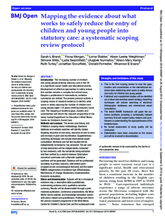Displaying 421 - 430 of 1510
The aim of the study was to examine sex differences in self‐reported psychological distress, behavioural and emotional problems, and substance use in young people living in out‐of‐home care (OoHC) in metropolitan Melbourne, Australia.
This study sought to examine the psychosocial challenges facing children in residential childcare facilities in the Mashonaland Central province, Zimbabwe.
This article explores how the type of placement in children's social care influences identity formation and contact with the birth family. It draws on 40 life history interviews with Romanian-born, care experienced young people who entered adulthood from different types of placement: 16 from residential care, eight from foster care, seven from domestic adoption and nine from intercountry adoption.
The current study examines past adverse experiences and current functioning of adolescent males in out-of-home care, relying on data from the Assessment and Action Record—second Canadian version for a representative sample of 508 12- to 17-year-olds in out-of-home care across the province of Ontario (Canada).
The purpose of this short paper is to contribute evidence regarding the situation of children without parental care and suitability of alternative care.
The aim of the present quantitative study is to examine how perceived maternal acceptance-rejection contributes to the risk of mental illness in orphaned adolescents.
The objectives of this study were to 1) examine the relative risk of suicide among children in residential care compared with those not in residential care in South Korea, 2) evaluate how the relative risk of suicide is associated with age, and 3) explore the trend in relative risk of suicide over time.
The present protocol outlines a scoping review of research evidence to identify what works in safely reducing the number of children and young people (aged ≤18 years) entering statutory social care.
Based on field studies and in-depth interviews across rural and urban China, this book presents a socio-legal analysis of non-state organised care for some of China's most vulnerable children.
This article describes the process of revising a measure of out‐of‐home living restrictiveness to be culturally congruent for Portugal, providing preliminary data on validity and reliability, and discusses the feasibility of using this measure in Portugal.



